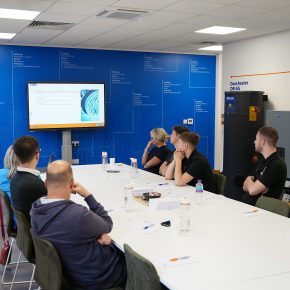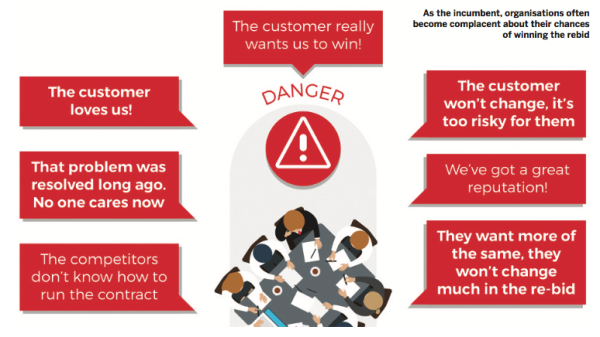
Is there ever a case for knowing too much in a bid process?
At an APMP event held in London, the majority of attendees on the bidding side were adamant that, given the choice, they would choose not to be part of a tender in which they were the incumbent supplier.
The response follows Attitudes to Incumbents (Rebidding Solutions 2014) research which found that, while in the commercial sector the incumbent supplier is frequently successful in tenders, in the public sector incumbent wins are less predictable. Isabel Moritz, events director at APMP UK discusses in this month’s PSB Magazine…
The above mentioned research might come as a surprise for many people not involved in public sector bidding. Surely an incumbent must have a huge advantage in terms of relationships and inside knowledge, not to mention the fact that they have a proven track record and capability? Is it possible, however, to know too much?
One of our members recently raised the dilemma of how to address any wrong assumptions that have been made in the tender document.
For example, as an incumbent, do you actually cost an element that you know is not possible under the current operation, bearing in mind that the other bidders will – resulting in a situation where procurement teams may not be comparing like for like? Are you viewed as being helpful or disruptive? This is increasingly an issue on electronic tenders where there is no opportunity to discuss queries and any deviation from answering the exact question is discouraged.
In some cases there is, perhaps, a temptation to pitch for what you are currently delivering, rather than what is in the tender document, which is a real mistake. It is also very hard to propose any new ideas without risking questions as to why you haven’t proposed them before. You are also aware of what works and what doesn’t, as you have probably evaluated many options. Examine any such observations carefully before including them in your bid, as resulting initiatives even create a perception that you are either arrogant or complacent.
At our London event, a senior local authority procurement executive said that, in his experience, incumbent teams look back while newcomers look forward and that a successful bid should be able to do both. While he recommended bringing in some fresh eyes, he also said that he had seen cases where a new bid team, parachuted in with no prior knowledge of the operation, has neglected to speak to the people actually operating the contract.
As a result it has thrown out everything achieved during the contract period – both good and bad. This, to me, is incomprehensible and certainly does not meet any of the standards and best practice to which our membership adheres.
There is no doubt that being the incumbent brings its own challenges. I would recommend starting the process as soon as possible and perhaps even trying to influence the thinking of the procurement team by sharing your experience and understanding of the contract.
A good bid team must be able to apply its privileged supplier insights intelligently and carefully, for example, not overpricing rebids because of its knowledge of the reality of the contract.
Latest news

24th April 2024
Hamworthy Heating expands CIBSE approved CPD modules with new hot water series
Hamworthy Heating, technical experts in commercial heating and hot water products, announce the expansion of its market leading CIBSE approved Continuing Professional Development (CPD) portfolio with the launch of three new learning modules.
Posted in Articles, Building Industry Events, Building Industry News, Building Products & Structures, Building Services, Continuing Professional Development (CPD's), Facility Management & Building Services, Heating Systems, Controls and Management, Heating, Ventilation and Air Conditioning - HVAC, Plumbing, Retrofit & Renovation, Seminars, Training
24th April 2024
New technology partnership brings Passivent ventilation products to IESVE
Passivent has partnered with Integrated Environmental Solutions (IES) to make a number of its products available to model within the Virtual Environment (VE) platform IESVE.
Posted in Air Conditioning, Articles, Building Industry News, Building Products & Structures, Building Services, Facility Management & Building Services, Heating, Ventilation and Air Conditioning - HVAC, Information Technology, Innovations & New Products, Posts, Retrofit & Renovation, Roofs, Ventilation
23rd April 2024
Geberit brings Parallel World to Clerkenwell Design Week
Visitors to this year’s Clerkenwell Design Week (21 – 23 May) can step into a parallel world and discover the benefits of cleaning with water, thanks to Geberit.
Posted in Articles, Bathrooms & Toilets, Bathrooms, Bedrooms & Washrooms, Building Industry Events, Building Industry News, Building Products & Structures, Building Services, Exhibitions and Conferences, Innovations & New Products, Interior Design & Construction, Interiors, Plumbing, Restoration & Refurbishment, Retrofit & Renovation
23rd April 2024
Mitsubishi Electric Ecodan Heat Pumps and Water Cylinders to be stocked by The Boiler Shop
Mitsubishi Electric’s full range of Ecodan heat pumps and hot water cylinders are to be stocked by one of the north-west’s best established independent merchants, The Boiler Shop.
Posted in Articles, Building Industry News, Building Products & Structures, Building Services, Facility Management & Building Services, Heating Systems, Controls and Management, Heating, Ventilation and Air Conditioning - HVAC, Plumbing, Posts, Retrofit & Renovation, Sustainability & Energy Efficiency
 Sign up:
Sign up: 
